
Published by BusinessToday, AstroAwani, MediaVariasi & TheStar, image by BusinessToday.
Analysis of extensive empirical research on the Malaysian brain drain highlights a persistent and substantial issue spanning several decades. Despite its entrenched and well-established presence, successive administrations have consistently neglected this matter, resulting in its escalation into a formidable challenge now inherited by the present government.
Meanwhile, the voices of the Malaysian brain drain echoing through decades of research emphasise the urgent need for effective measures to alleviate this phenomenon. They also offer crucial insights that can’t be ignored in devising effective interventions driven by data, science, and economics.
EMIR Research has previously explored the topic of Malaysian brain drain through empirical research in its earlier publications (refer to the seminal publication “Malaysian Brain Drain – Don’t Go Chasing Waterfalls”).
However, an even more exhaustive literature survey integrates comprehensive and systematic analysis of quantitative and qualitative empirical evidence on the pull-push factors behind the brain drain in Malaysia to better aid concerned policymakers.
Forty scholarly works met the criteria: empirical studies on factors driving the Malaysian brain drain spanning the period from 2008 to 2023, with most emerging between 2011 and 2017 (Figure 1).
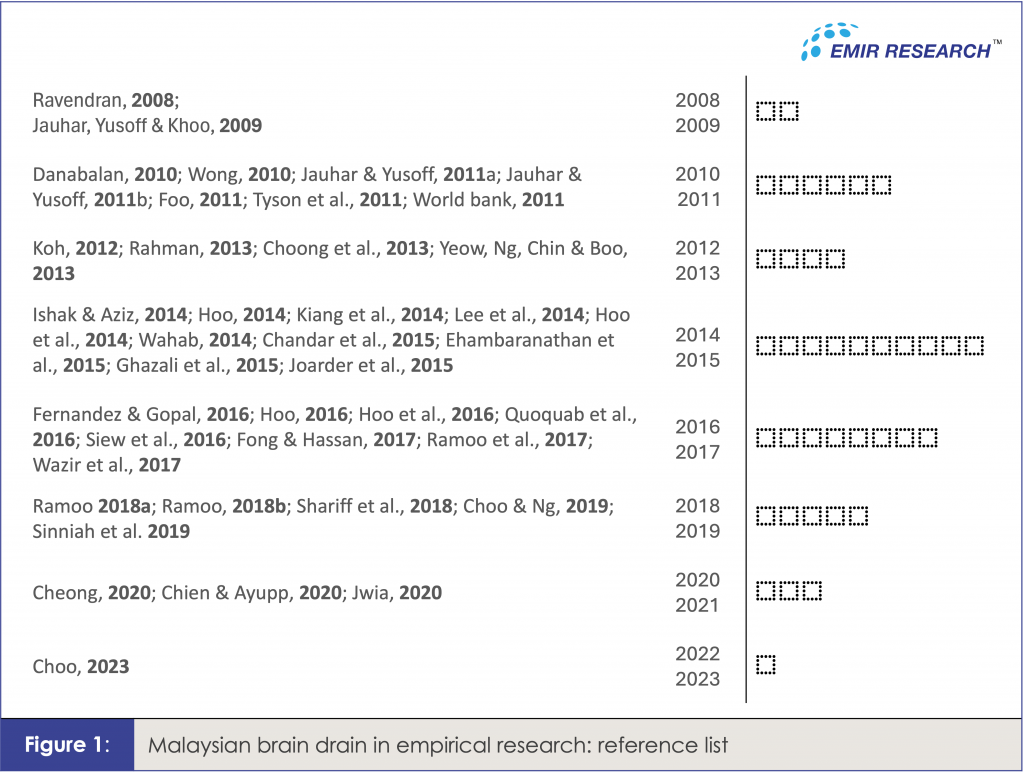
This body of knowledge encompasses perspectives from both individuals already living and working abroad (the actual brain drain) and those who were merely intending to join the exodus at the time.
Thematic content analysis, a qualitative research technique, was employed to neatly organize the findings within the push-pull framework.
The famous pull-push migration theory (Lee, 1966) is the most generic framework to study brain drain. While comparing the origin and destination locations, migrants evaluate certain conditions that are perceived either as unfavourable (push factors) or benevolent (pull factors) (Figure 2).
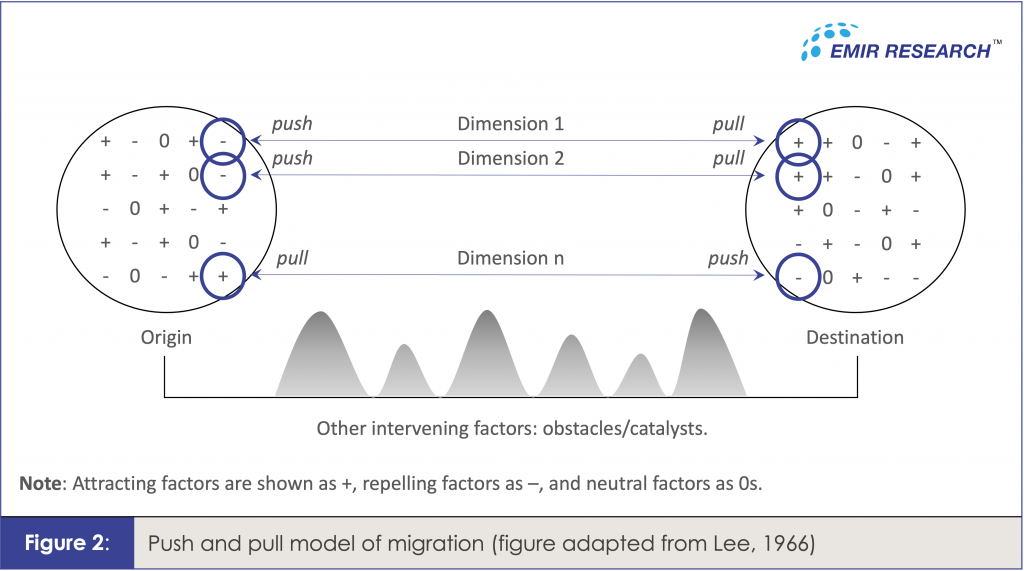
In the context of the Malaysian brain drain, the first group of influential factors pertains to various dimensions of work: salaries and perks (32 studies found this to be an influential factor), job prospects (22 studies), promotion prospects (12 studies), prospects for professional growth and personal development (32 studies), and a stimulating and conducive work environment (37 studies) — all seen unfavourably when compared to foreign destinations.
For instance, variables empirically linked to the Malaysian brain drain grouped under the theme of “salaries and perks” reveal that wages and other work-associated compensations have been seen as significantly lower (especially after adjustment for cost of living) compared to those offered in other countries, with some researchers consistently documenting even fourfold difference. The issue of salaries also includes slow wage growth (significantly lagging productivity growth and disproportionate to the rising cost of living), wage-skills gap, and low starting salaries for skilled graduates.
Apart from unsatisfactory salaries and benefits, finding a suitable job position matching the level and area of expertise has been a persistent challenge in Malaysia, particularly regarding the scarcity of opportunities in Research and Development. This issue is compounded by employers’ preference for low-skilled foreign labour. Moreover, job security, in terms of its stability, has been perceived to be more promising overseas.
Promotion prospects, seen dim in Malaysia, have been pushing out our brightest compatriots as well. The dearth of promotional opportunities is well associated with the lack of industrial development. However, in addition to this, in the Malaysian context, poor recognition within organisations carries very distinct undertones of social injustice and cultural aspects, as reflected in various research findings.
Skimpy prospects for professional growth and personal development have been as widely linked to Malaysian brain drain as unsatisfactory salaries. The array of factors encompassed within this theme is revealing—Malaysian professionals perceive local industries as unable to offer adequate career advancement pathways to achieve their goals of personal growth, development and self-actualisation. This includes a glaring void of opportunities to learn new techniques and skills (aligned with global sci-tech trends), receive stimulating training, tackle challenging job scopes, and access state-of-the-art equipment and research facilities.
Furthermore, the lack of a stimulating and conducive work environment emerges as the most widely empirically linked factor to the Malaysian brain drain. This encompasses issues such as poor work-life balance, lack of dynamism, creativity and innovation, rigid and autocratic traditions in organisational settings with a lack of autonomy and low participation in decision-making, extreme work stress, poor human resource management, an environment that is not harmonious, not motivating, and unfulfilling in terms of working with non-talented colleagues. Low job engagement, conceptualised as employees’ psychological presence in their job when they put their hearts into their work and feel that their job is worthwhile, as well as low organisation engagement when employees are proud to tell others that they work for this organisation and being members of this organization is exhilarating for them, have also been empirically linked to Malaysian brain drain.
Figure 3 provides an important time perspective indicating that these have been significant and persistent issues over the last two decades yearning to be resolved.
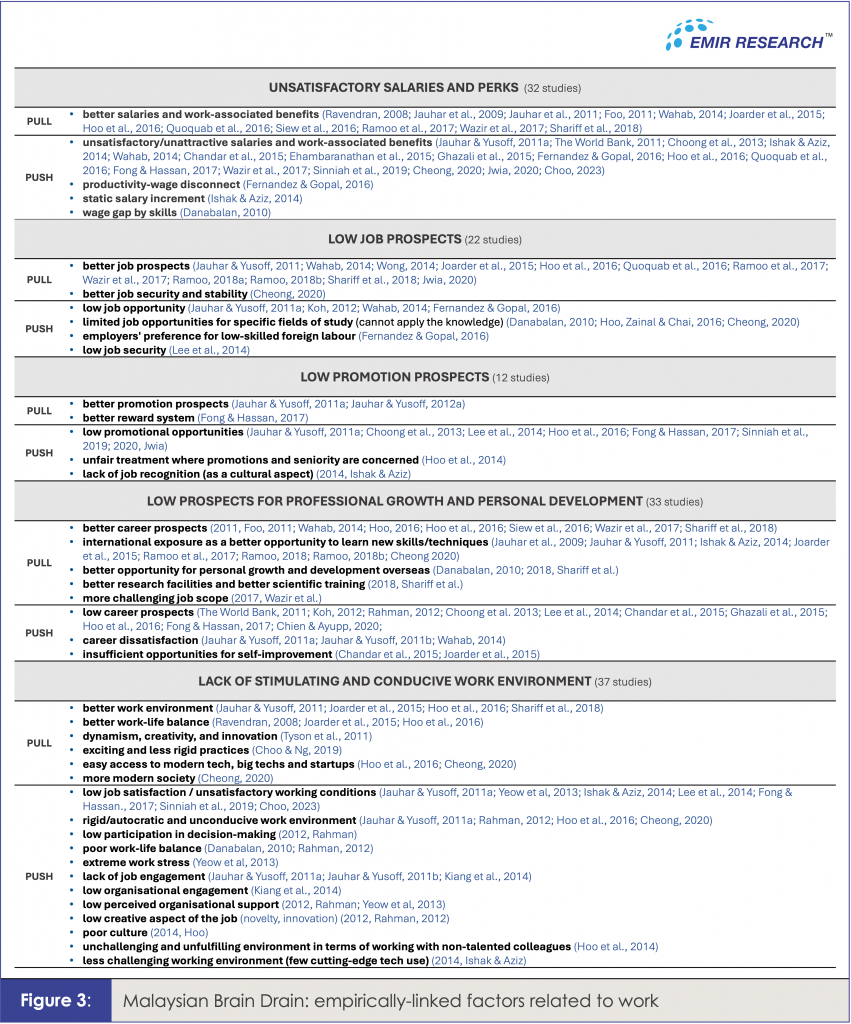
Another group of equally persistent factors revolves around the quality of life in its sociocultural, economic, and political aspects (Figure 4).
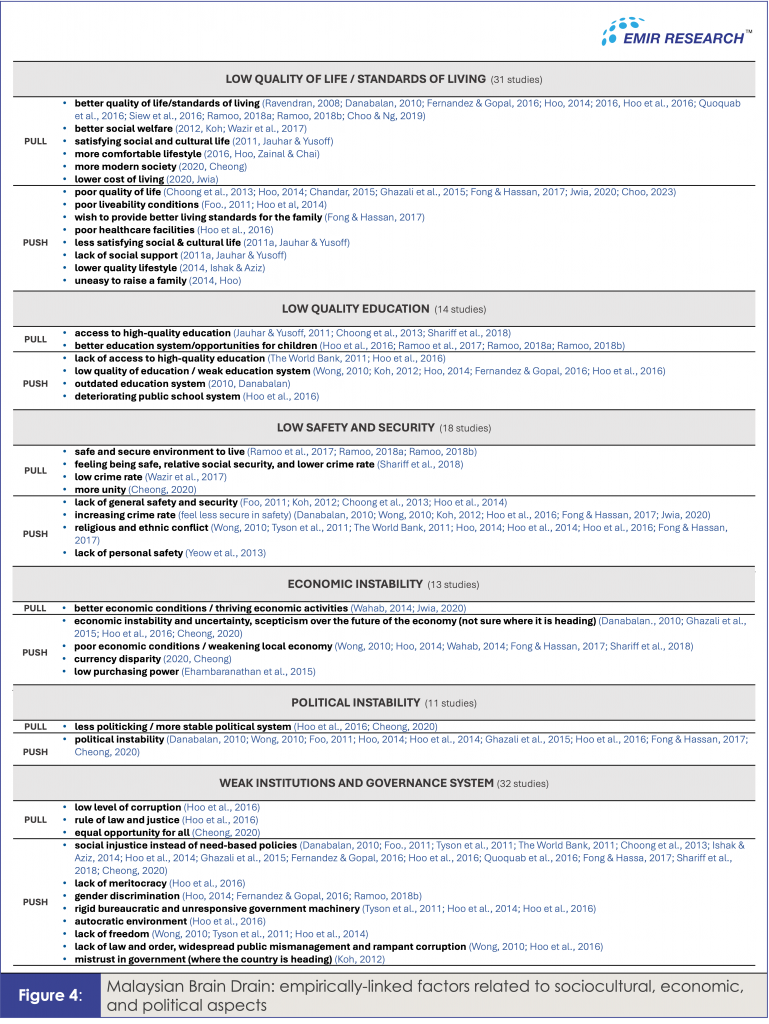
Firstly, there seems to be a widespread perception among the Malaysian brain drain that the quality of life or standards of living overseas are substantially superior to those in Malaysia—offering more comfort and modernity, better public facilities, better social welfare, lower costs of living, and a more satisfying social and cultural life.
Two crucial aspects of perceived better standards of living overseas have been empirically linked to the Malaysian brain drain so frequently that they warrant recognition as separate themes. One pertains to the quality of education, while the other concerns safety and security.
For those among the Malaysian brain drain who have children, a more effective education system overseas emerges as a significant factor, weighing heavily in their decision-making process. Conversely, the local education system, perceived as outdated, weak, and deteriorating is a sentiment that has been prevalent already since 2011.
Also notable is the persistent perception among the Malaysian brain drain that safety and security in Malaysia have been notably low over the years. This perception encompasses concerns about the high crime rate as well, as documented in research as early as 2010. Intriguingly, this perception contrasts with the fact that Malaysia have been ranked quite high on the dimension of safety and security in various global indices. Could it be that other salient factors, evidenced in empirical findings on Malaysian brain drain, such as a sense of ethnic and religious fractionalization, lack of social integration, and even a baseline level of racism—factors integral to safety and security—have contributed to this negative perception?
As components of quality of life, two additional prominent factors that have been consistently and strongly empirically associated with the Malaysian brain drain over the years are the allure of prosperous economies abroad and the lack of confidence in the uncertain path of the local economy, exacerbated by political instability.
Finally, last but certainly not least, as adjudged by the overwhelming number of empirical support, in this bundle is the Malaysian brain drain’s unmistakable yearning for robust institutions and governance systems, particularly those need- and merit-based and grounded in data, science and economic. These systems should be attuned to global techno-social trends, contrasting with environments where identity politics and corruption are entrenched like twin evils. After all, while Malaysian politicians have been involved in excessive identity politics over decades, Malaysia’s profound brain drain has been demonstrating evidently that in the globalised world the resources will always flow where they are the most needed and can be deployed most effectively.
Regarding other intervening factors, consistent with the pull-push migration theory (Figure 2), empirical research on Malaysian brain drain highlights several factors, including subjective normative pressure, chain migration, and cultural affinity (Figure 5).
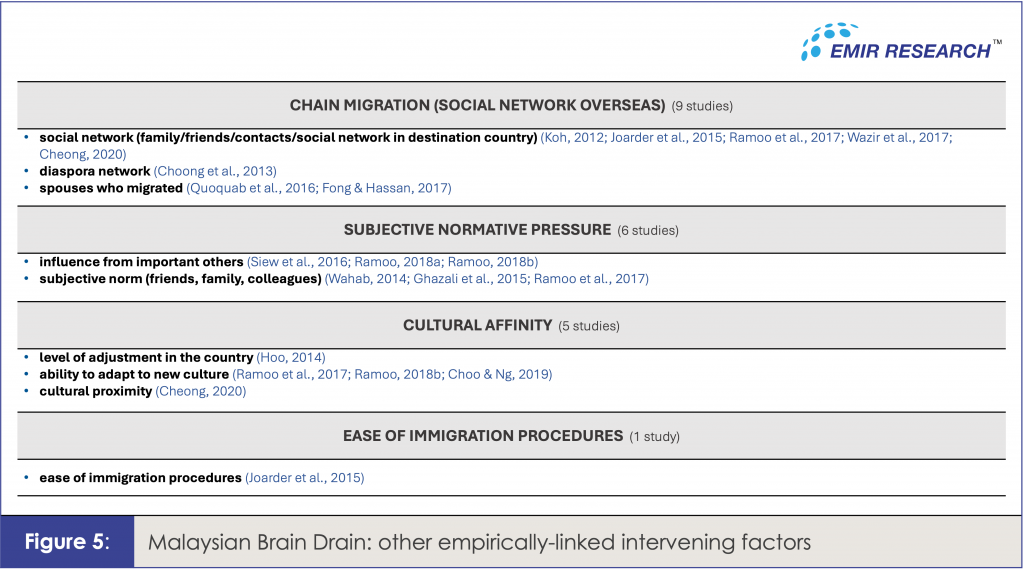
Subjective normative pressure encapsulates the perceived expectations and beliefs of others regarding an individual’s actions, including decisions about migration or career paths. This influence emanates from various sources, including family, extended family, friends, colleagues, and broader social and cultural norms. Thus, instances where family or colleagues encourage an individual to pursue opportunities abroad are not uncommon in the Malaysian context, as empirical research suggests.
As Malaysian brain drain is not a new issue, neither in its presence nor in its severity over decades, by now Malaysia might be struck, by the phenomenon of chain migration, as per empirical research findings. This occurs when a substantial Malaysian diaspora abroad establishes a vital support network, facilitating the migration of new members. Moreover, this network can exert subjective normative pressure, as indicated above.
Finally, cultural affinity ultimately describes the migrant’s capacity to readily acclimate to the values, traditions, language, customs, and other cultural elements of the destination country. This concept is exemplified by the Malaysian diaspora’s significant migration to geographically proximate but technologically very distinct Singapore.
The factors outlined above are compelling and must not be ignored. They should be of paramount interest to policymakers and anyone genuinely committed to finally setting things right in this country for the benefit of the MANY.
Dr Rais Hussin is the Founder of EMIR Research, a think tank focused on strategic policy recommendations based on rigorous research.

